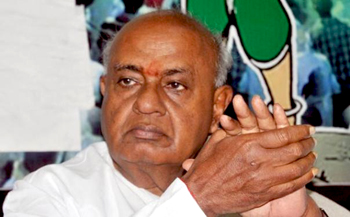Bengaluru, May 20: JD(S) leader H D Deve Gowda on Thursday said that his party was assured of a Cabinet berth in the to-be-formed LDF government in Kerala.

Speaking to reporters in Bengaluru, Gowda, expressing happiness over his party's performance, said that whenever the LDF came to power, it had always given a ministerial post to a JD(S) legislator.
“Irrespective of the number of seats won by the JD(S), the LDF has always accommodated us in the Cabinet. Like the previous term, this time too JD(S) has been assured of a Cabinet berth. There is no need to lobby for it,” he said in response to a question. Taking a dig at the Congress, Gowda said that the national party had lost its stronghold in a majority of the states which it had ruled in for over a long time.
“The presence of Congress has dramatically dwindled over the last few years. After Rajasthan and Delhi, the party has now lost its base in Assam and Kerala. As a result, there is no other party to give BJP a competition, except for the regional parties of the states. Except for Assam, only regional parties have emerged victorious in 4 other states in the results announced today. This is the people's mandate,” he added.
Gowda also congratulated AIADMK leader J Jayalalithaa and the TMC chief Mamata Banerjee for leading their parties to landslide victories.
He has also written congratulatory letters to the duo.





Comments
o Parabha podu ellad jeppu, he properly couldnt manage his son kumaraswamy he married and keeping one more women name (radhika), and he wants rule the party so called JDS, (Janara Double Samsara)
Add new comment